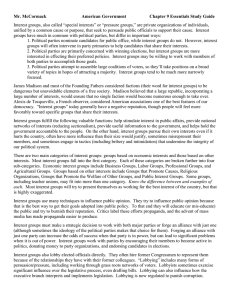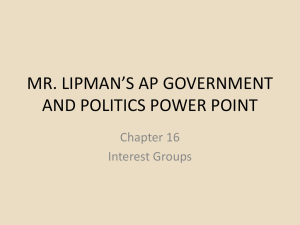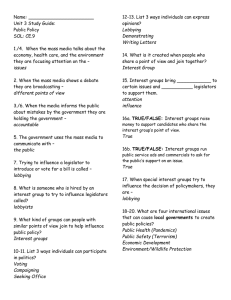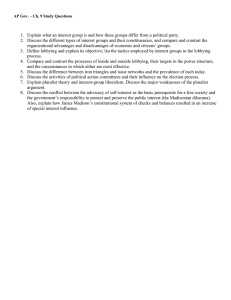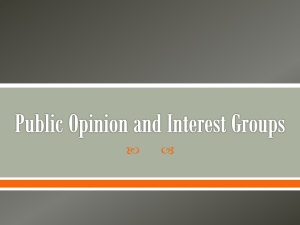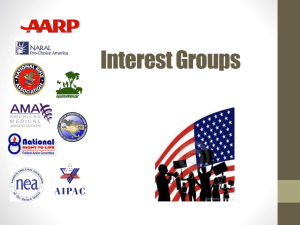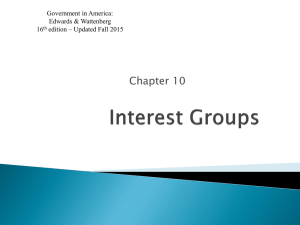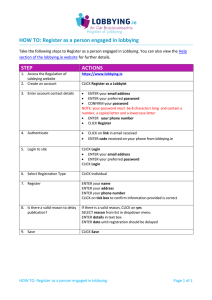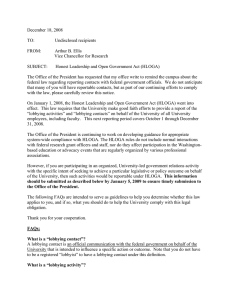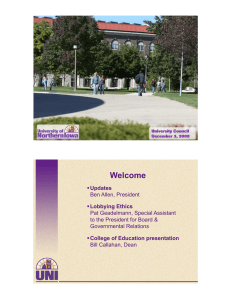interest group
advertisement
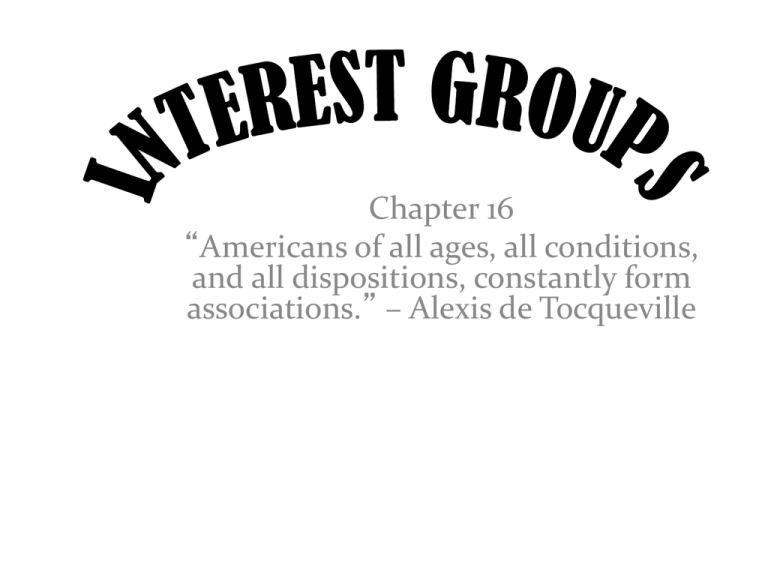
Chapter 16 “Americans of all ages, all conditions, and all dispositions, constantly form associations.” – Alexis de Tocqueville INTEREST GROUPS • advocacy group, lobbying (lobbies) group, pressure group, or special interest = interest groups • a group that is determined to encourage or prevent changes in public policy (ALL LEVELS) without trying to be elected Definition • An interest group is an organized body of individuals who share some political goals and try to influence public policy • To lobby is to try to influence gov’t decisions through petitions or other means NOT Political Parties • Do NOT nominate people for office – Support candidates publicly and monetarily • Do NOT win elections – Control or influence policies of government (Issue Networks) • Do NOT focus on every issue – Specialized in the interest Are interest groups good or bad for Americans politics? • PLURALISM: Many interests and groups prevents one from being too powerful – Linkage Institution – links people and government, gives voice to people – Federalist 10 – factions are bad, but a necessary evil – ELITE AND CLASS: Most interest groups have no power – Power held by business groups – MONEY • HYPERPLURALISM: TOO MANY GROUPS – Government trying to please everyone, resulting policies are haphazard and ill-conceived – Ex. – support removing business regulations and support environment protection??? TYPES OF INTEREST GROUPS • Interest groups are formed according to race, gender, ethnicity, age, occupation, sexual orientation, hobbies – speak for some, not all Americans – A.K.A. “special interests” – sometimes results of movement politics » civil rights, environment, animal rights, women’s rights » label actions “right” and “wrong” – Movements protected by Constitution and can therefore operate inside the law TOP CONTRIBUTORS • • The organizations themselves did not donate , rather the money came from the organization's PAC, its individual members or employees or owners, and those individuals' immediate families. Organization totals include subsidiaries and affiliates. Because of contribution limits, organizations that bundle together many individual contributions are often among the top donors to presidential candidates. These contributions can come from the organization's members or employees (and their families). The organization may support one candidate, or hedge its bets by supporting multiple candidates. MEMBER INFLUENCE • Size • Power of AARP – 25% of the population 50 and over • Intensity – drive or effort put forth (single issue groups fall into this category) • HELPS provide more information on ISSUE or CANDIDATE endorsing HOW GROUPS SHAPE POLICY • Lobbying – direct political persuaders who represent organized groups • Electioneering – method of groups to elect and keep politicians who favor their policy – HOW IG INFLUENCE ELECTIONS! • Litigation – using the courts as a means of changing policy – Amicus curiae briefs: “friends of the court” • File briefs that consist of a written argument for their side • Going Public – using PR and media techniques to curtail public opinion – can be POSITIVE and NEGATIVE! LOBBYISTS!!! • Physical representation of IG • Attempt to influence decisions of legislators LOBBYING STEREOTYPE • Arm twisting, bribery, hand out campaign contributions, dubious ethics REALITY • Provide INFO. Constant flow of data that support their organization – “facts dictate change in policy” THE REVOLVING DOOR • A criticism of interest groups • Government officials quit their jobs or don’t get reelected • Then take government jobs for a certain lobbying agency • Fear that private interests by business have an unfair influence on gov decisions • Ex- official does favor in return for later job
